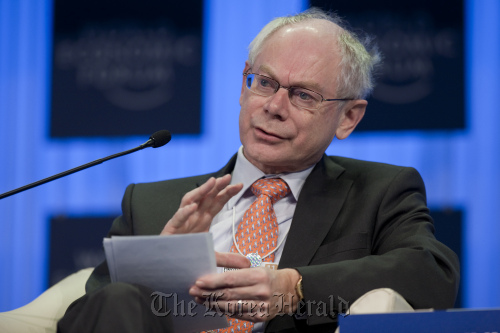European Union President Herman Van Rompuy ruled out issuing common bonds as a cure for the debt crisis, saying any joint borrowing should wait until European economies and budgets are better aligned.
With three countries drawing financial aid and national debts ranging from 6.6 percent of gross domestic product in Estonia to 142.8 percent in Greece, this is the wrong time to set up a single borrowing agency, Van Rompuy, 63, said in an interview broadcast on Belgium’s RTBF radio Saturday.
“We could have euro bonds on the day when there is genuine budgetary convergence, the day when everyone is in balance or virtually in balance,” he said.
 |
Herman Van Rompuy, president of the European Council (Bloomberg) |
Pledges of 365 billion euros ($526 billion) in official loans to Greece, Portugal and Ireland, and 96 billion euros of bond purchases by the European Central Bank have failed to fix the finances of those countries or prevent speculative attacks on Spain and Italy.
Van Rompuy sided with Germany and France in damping down the euro bond debate, saying the answer to the crisis lies in executing plans like last month’s decision to give more flexibility to the bloc’s 440 billion-euro rescue fund. He urged governments to quickly ratify the plan so the fund can buy bonds in the secondary market.
French Prime Minister Francois Fillon wrote in Le Figaro newspaper today that common issuance would “increase the cost of servicing French debt and might even put its credit rating in doubt.”
Van Rompuy said unwarranted panic sparked the selloff of Italian and Spanish bonds that led the European Central Bank to intervene earlier this month. He praised both countries for enacting further budget cuts.
“Markets aren’t always right,” Van Rompuy said. He cited purchases of the Swiss franc, which jumped 14 percent in value this year, as an example of investors overreacting to European debt concerns and the U.S. credit downgrade by Standard & Poor’s.
“If the Swiss franc becomes a safe haven currency, it’s because something fundamentally disproportionate is going on in the world’s markets,” he said.
While European growth is slowing from the first half of this year, the continent enjoys healthy economic fundamentals and will escape recession, he said.
Van Rompuy said a six-part package of laws to strengthen Europe’s rules on national deficits is likely to be passed next month.
Europe’s next move will be to streamline its communications policy to defuse public disagreements between governments that undermine market confidence, Van Rompuy said, previewing proposals he will make at an October summit.
“I will propose some ideas to improve both communications and crisis management,” he said. “We have to try to give the same message. It’s inevitable that there will be several voices. But everyone has to convey the same message.”
Europe continues to promote a financial-transaction tax, though there are doubts that it would work in the 17-nation euro area if it isn’t imposed globally, Van Rompuy said. Britain and Sweden last year led efforts to prevent such a tax from covering the 27-nation EU.
Van Rompuy, a former Belgian prime minister, said breakup scenarios for Belgium and the euro zone “are really two fictions.”
(Bloomberg)





![[Herald Interview] 'Trump will use tariffs as first line of defense for American manufacturing'](http://res.heraldm.com/phpwas/restmb_idxmake.php?idx=644&simg=/content/image/2024/11/26/20241126050017_0.jpg)


![[Herald Review] 'Gangnam B-Side' combines social realism with masterful suspense, performance](http://res.heraldm.com/phpwas/restmb_idxmake.php?idx=644&simg=/content/image/2024/11/25/20241125050072_0.jpg)